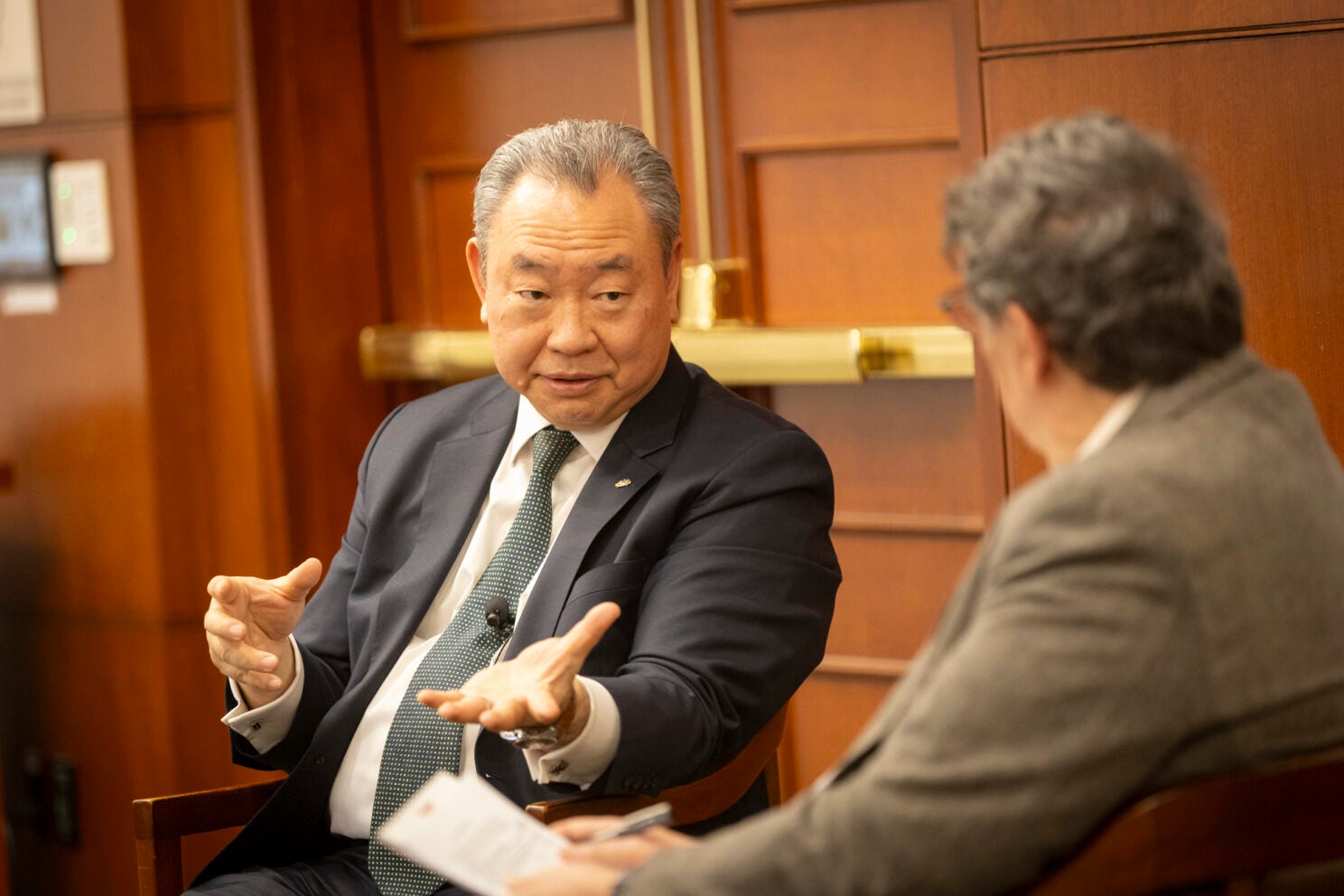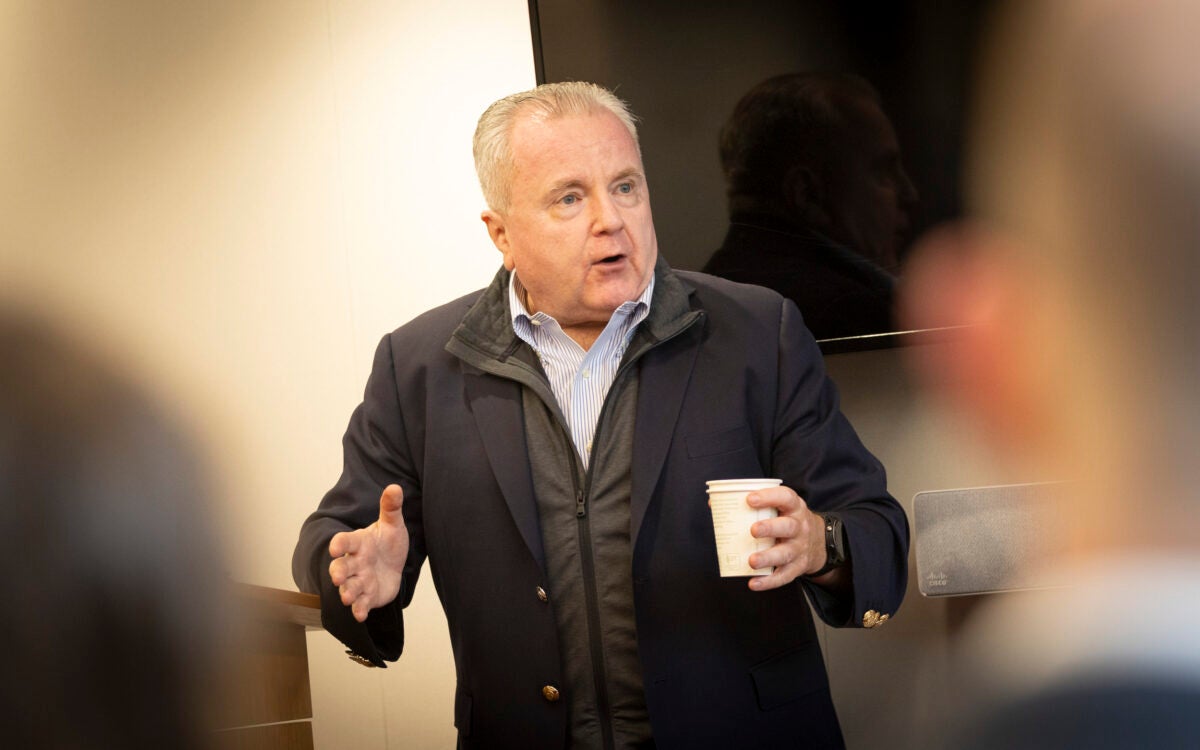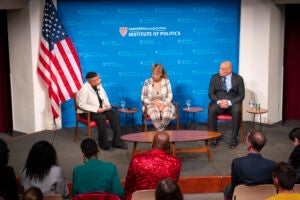
Ambassador Alexander Tah-ray Yui with Anthony Saich.
Niles Singer/Harvard Staff Photographer
Taiwan sees warning signs in weakening congressional support for Ukraine
Ambassador says if Russia is allowed to take over sovereign nation, China may try to do same
Taiwan’s top U.S. diplomat said America’s relations with Taiwan remain strong, but softening support on Capitol Hill for Ukraine amid growing isolationist sentiment could be a worrisome preview of what’s to come.
During a visit to Harvard Kennedy School, Ambassador Alexander Tah-ray Yui gave a short address at HKS and spoke at length with Anthony Saich, Daewoo Professor of International Affairs and Rajawali Foundation Institute for Asia, about the difficulties facing Taiwan from China.
Taiwan, a self-ruled democracy that China claims as its territory, still enjoys robust, bipartisan backing in Washington and counts the U.S. as its most important ally, Yui said, calling the relationship “existential.”
“The well-being of Taiwan to exist as it is, for the Taiwanese people to be able to continue voting for its president in four years, has a lot to do with our relations with the United States,” said Yui, who was named to the post following the election in January of Lai Ching-te, the Democratic Progressive Party candidate. He briefly served as Taiwan’s representative to the European Union in 2023.
An island about 100 miles off the Chinese mainland with a population of 23 million, Taiwan is the U.S.’s eighth largest trading partner. It produces 60 percent of the world’s semiconductors.
During the Biden administration, the U.S. has stepped up criticism of Chinese aggression toward Taiwan and worked to deepen economic ties between the two. Taiwan Semiconductor Manufacturing Co. (TSMC), the world’s largest chipmaker, will open a $40 billion manufacturing facility in Arizona in 2027 or 2028.
Saich asked Yui whether Taiwan looks at the political divide in Congress over providing further aid to Ukraine and sees potential for a spillover effect. The ambassador said the developments are “really concerning,” particularly given China’s other moves to isolate Taiwan in the international community.
Chinese leaders have been using “checkbook diplomacy” for decades in Latin American and African countries such as Costa Rica, Liberia, and Panama, he said. They promise to finance massive infrastructure projects in these nations in exchange for severing diplomatic relations with Taiwan.
For a time, Taiwan did its best to compete, but last year officials signaled that they would no longer pursue the strategy against the far larger and wealthier China.
Nearly two dozen countries recognized Taiwan in 2012. Currently only a dozen maintain official diplomatic ties, an acceptance of Beijing’s “One-China” policy that Taiwan is a province of China and not a separate state. But Taiwan continues to have a number of unofficial allies, including the United States.
Yui said China unsuccessfully attempted to tip results in favor of the more mainland-friendly Kuomintang party during Taiwan’s presidential election in January through disinformation campaigns, economic coercion, and military threats.
Yui said Taiwan identifies with Ukraine and its struggle to fight off Russia, a much larger and more powerful neighbor that refuses to recognize its sovereignty.
“I think the key part about Ukraine is that we can’t let Russia win Ukraine because [that] will be admitting that a larger power, by moving against a smaller power, can get [away] with it. You can win without consequences. So, helping Ukraine defend itself is important. And also, to let Beijing know that if they have any thoughts on Taiwan in a similar situation, they will not win, they will not get away with it and that there will be consequences,” Yui said.
Yui acknowledged criticism that Taiwan, whose economy last year ranked as high as the world’s 20th biggest based on GDP, relies too heavily on U.S. support for its defense is not entirely unwarranted.
“We are very conscious of being able to spend enough to preserve our combat readiness, and we will do what is needed to do so,” he said.
Taiwan boosted its defense spending in recent years to 2.6 percent of its GDP and is “not waiting for the U.S. to rescue” it, a perception fostered by China as a part of its global influence campaign to weaken U.S. support for the Asian republic.
Observing how Ukraine has robustly managed to defend itself has been instructive, Yui said. Taiwan is improving its military readiness, its equipment, and reserves, and better preparing its whole society’s resilience and civil defense. In the run-up to January’s election, all three political parties agreed that Taiwan needed to improve its defense capabilities.
“People say that democratic government doesn’t work well in Asia, but it does work very well in Taiwan, so we want to preserve that,” he said.




